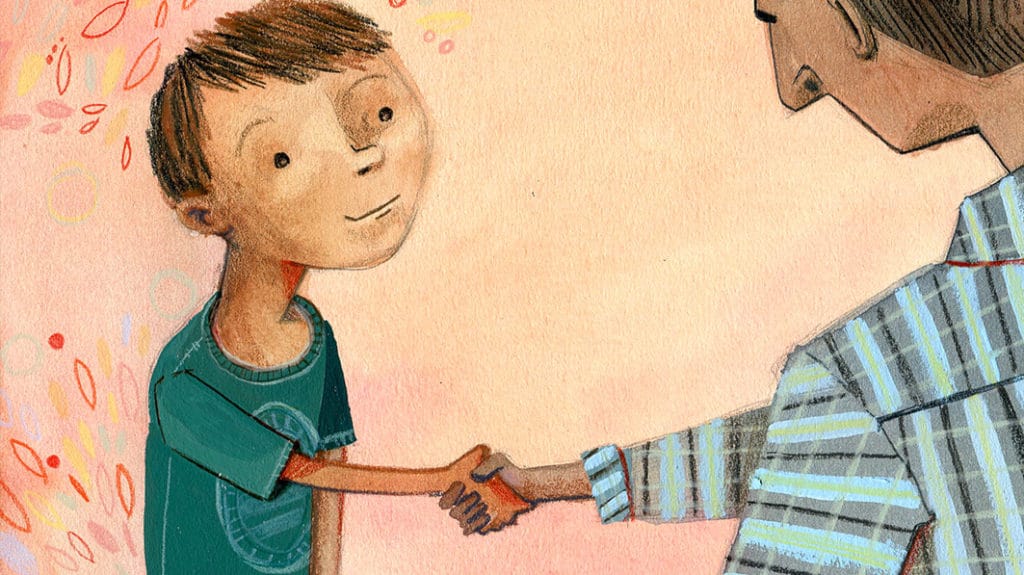One of my 10-year-old twin sons folded his report card in half and said, “Look, Mom, I made all A’s.”
As I praised my son for his achievement, I unfolded the card, revealing less than satisfactory marks on the other side. Many of the nonacademic entries, such as “Is respectful to authority,” were marked with unusually large U’s. His teacher had commented: “He says things without thinking. Sometimes his words hurt other people’s feelings.”
The words of an educator I had heard years earlier came to mind: “You can make all A’s and still flunk life.” I didn’t want that to happen to my son. The evidence was clear: He had to learn respect for others.
I knew from experience that respect wasn’t an action I could force on my sons, like “clean your room” or “do your homework.” I could require my boys to behave respectfully toward each other and those in authority, but to bring about a lasting transformation, I had to get to the heart of the issue — my son’s attitude toward others.
As I worked with my son on his attitude, I discovered that children need to learn about respect in age-appropriate ways. Here are a few tips parents can use to help their children develop an attitude of respect:
Tots
Newborns learn about the world through parents, their first teachers. This connection to the world develops as parents meet their emotional and physical needs. At this early stage, children have two questions that need answers: “Can I trust you?” and “Who’s in charge?”
Setting a routine for feeding and napping gives our infants and toddlers the assurance that we are meeting their needs and can be trusted. In the process, we help them take the first step toward respecting authority.
The second step relies on our children understanding that we are the ones in charge. Bedtime during the toddler stage is a key testing ground. You serve them best when your “no” means “no” and you consistently enforce your expectations. Toddlers and preschoolers learn quickly when a “no” actually means “maybe.”
Through all your interactions with your children — as you teach them where they can play and what they can play with — the goal is to have kids understand that a parent’s “no” is more important than a child’s “yes.” This can be done in small ways, such as with knick-knacks that you have on low tables or other items. This training, of course, takes patience and time. But basic respect of a parent’s property is the foundation for respecting the property of others. Children eventually realize that some things belong to siblings, friends and storeowners.
Tykes
This age group is actively exploring the world. They are asking, “Are you watching me?” and “To whom do I belong?” As answers, kids need two distinct assurances: the security of knowing you’re watching them and the understanding that they’re a valuable part of your family.
At 4, one of my sons escaped my watchful eye and left to explore the rest of the New York Museum of Natural History on his own. Frantic with worry, I eventually found him holding a handrail near a display of prehistoric creatures. His eyes were filled with tears, but he said, “I’m OK, Mom. I knew you would find me.”
Knowing that you are watching your child’s exploration grows his trust in you. He knows he is valuable and protected, so he doesn’t expend a lot of emotional energy trying to meet his own basic needs. This frees him to respond unselfishly and to show concern for others, which is the essence of respect. Of course, this type of a response usually doesn’t come naturally to children, even when they are freed up to act appropriately. Here is what you can do to train tykes to respond respectfully to others:
- Find small ways for children to be unselfish by practicing compassion and concern, such as dropping a few coins into charity boxes or in the collection plate at church, or saying a prayer for those who may be in trouble when you hear sirens or see emergency vehicles. This trains your children to think beyond their own needs, which will help them further develop their hearts to hold respect for others.
- Say “thank you” to your children, and prompt them to do the same to others with a “What do you need to say?”
- Ask them to give up their seats and to open doors for the elderly.
- Establish the boundary between being an adult and a child, such as not being given the freedom to interrupt a conversation between adults, unless invited to do so.
Tweens
Tweens are moving beyond childhood boundaries and interacting more with more people outside of your family. Your relationship is still of vital importance to them, even though it is changing. A 10-year-old doesn’t ask directly, “Do you really love me?” and “Are you real?” but he does ask through his actions.
Your tweens need to know you really hear them through eye contact and by responding to what they say, instead of “uh-huh” listening. What is being said may not seem of vital importance to you, but it is to your children. And if there is a good reason to say no, you need to say it. You are not your kids’ peer. They need you to be their parent, even when you find you enjoy your children’s maturing personality.
Tweens are also watching to see if you are living out what you are teaching them, wanting to know if you are authentic. They will test you, of course, but they are more likely to obey the rules you’ve established if they have an ongoing relationship with you and respect how you live. Authenticity commands respect.
In addition to holding them responsible for what they’ve learned about respect as tykes, here are some additional ideas to help train your tweens to treat others with respect:
- Don’t allow tweens to speak disrespectfully of each other or their friends, not even when done humorously. Use a respectful tone of voice with your children, and expect the same from them. When you fail, ask for forgiveness. Accept apologies when your children fail, too.
- Expect your tweens to do chores, such as cleaning their rooms and the bathroom they use, not for their comfort, but so the bathroom will be clean for the next user. This helps them understand the work involved in having personal property.
- Ask your kids to write old-fashioned thank-you notes. Doing this helps them understand that being hosted by anyone, even spending the night at a friend’s house, is a gift of another person’s time.
Help them practice a firm handshake while making eye contact with the other person.
- Find opportunities to serve others. Service trains kids to think outside of their perspective. It teaches them that others may not think or act as they do but should still be given respect.
Teens
Because teens are seeking to understand who they are and what is happening in the world around them, parents can help them develop self-respect, which teaches them why they should treat others with respect. This focus is similar to the principle of the Golden Rule, but using respect: Teens should respect others because that is how they would like to be treated.
Along with teaching self-respect, you also can emphasize that sometimes they will have to face the disapproval of others in order to do what is right (the reasons we do what we do are sometimes more important than how we do them).
The way to teach self-respect is through responsibility. Start giving more responsibilities to your teens and emphasize that their choices will determine who they become. Each accomplishment allows them an opportunity for self-respect. Through responsibility, they can learn that their decisions have consequences, and they will be given time to practice taking charge of their own daily challenges. Of course, piling on too many responsibilities sets up teens for failure or puts them in danger, so parents should use common sense in regard to how much and how quickly tasks should be handed over, based on their teens’ personality and maturity.
As teens step out in this arena of more responsibility, they will rely on their strong connection to you, even when they don’t show it. Here are ways to continue training your children to be respectful of others:
- Involve your teens in conversations you have with other adults. Help them find the balance between taking over the conversation and participating. Invite adults over so your teens can practice interacting in adult conversations.
- Request that your teens not go over to a friend’s house without first calling to ask if they can drop by. By doing this, you teach them to put the needs of others ahead of their wants.
- Require that your teens offer to help serve and clean up at meals so that it becomes second nature no matter where they are.
- Help your teens understand that their clothing choices show respect for the written or unspoken standards of those in authority, whether at school, church, or other get-togethers and events.
Insist that they keep their word and commitments.
While there are no guarantees in parenting — because children ultimately make their own choices — don’t ever forget that your children will benefit most from having a strong relationship with you, rooted in respect and the knowledge that you love them enough to teach them the importance of respect for others.
To be respected, we must first respect.

























